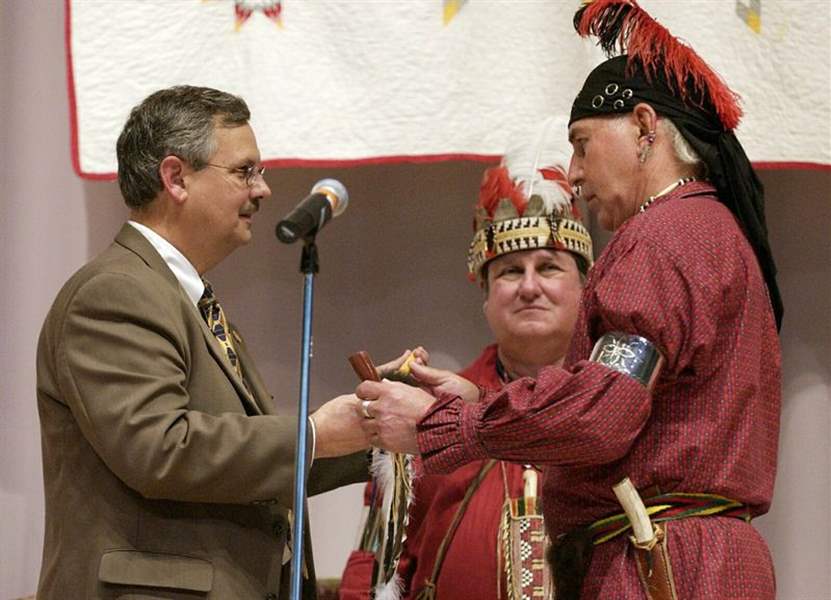
Methodists apologize to native tribes
6/12/2003
United Methodist Bishop Bruce Ough, left, receives a peace pipe from Larry 'Ayapia' Eveland, a Shawnee Indian from Cincinnati, as the two exchange gifts of reconciliation. Looking on is Rev. Fred Shaw, a Methodist pastor and Shawnee storyteller.
“Lord, we confess that we enjoy a prosperity and a civilization that are built upon the lands, the civilizations, and the blood of others,” said Bishop Bruce Ough, head of the West Ohio Conference of the United Methodist Church, during the 90-minute ceremony attended by more than 2,500 people.
The Rev. Fred Shaw, a United Methodist minister and a Shawnee Indian from suburban Cincinnati, also apologized on behalf of Native Americans.
“God of forgiveness, we confess the blood that we have spilled in the madness of war,” said Mr. Shaw, whose tribal name is Neeake. “That anger still wells up within us so that we seek villains to hate rather than partners for creating a new world of peace.”

United Methodist Bishop Bruce Ough, left, receives a peace pipe from Larry 'Ayapia' Eveland, a Shawnee Indian from Cincinnati, as the two exchange gifts of reconciliation. Looking on is Rev. Fred Shaw, a Methodist pastor and Shawnee storyteller.
Leaders of the Methodist Church and the Native American tribes stressed that the service was not just about apologies for past misdeeds, but the beginning of greater understanding and cooperation in the future.
Bishop Ough said Methodists mourn the fact that the Native American population was reduced from 10 million when Columbus landed in 1492 to 300,000 by 1895.
Much of the service centered around Native American culture, including tribal music, dance, clothing, and an exchange of symbolic gifts.
Calvin Yashie Hill, a Navajo who lives in Grand Rapids, Mich., opened the service with a haunting song on a wooden flute. Later he gave a heart-wrenching speech that revealed the extent of the cruelty with which Native Americans were treated as recently as the 1960s.
As a child growing up on a reservation, he said, he was reared to speak only Navajo. When the U.S. government in 1969 ordered all Native Americans to learn English, he said he was taken away in a bus by a Christian missionary to a boarding house to study English.
When he tried to ask the missionary what was going on, the man struck him on the head, he said. “I still have the scar,” said Mr. Hill, dressed in a white Native American robe with an elaborate feather headdress. “He told me I would no longer speak that devilish language.”
The Native American children were told, “The whiter you become, the better chance you have to get into heaven,” Mr. Hill said, drawing gasps from the outraged audience.
He said he could not get over the bitterness until he became a Christian. “Then the anger and hatred were released from me. That's why I don't want an apology. I want a true confession from you to God,” Mr. Hill said.
Four women performed a Going to the Water dance, taking turns dipping their hands into a bowl of water, then letting the water cascade as they lifted their hands skyward, moving in a circle seven times to represent seven aspects of life.
Bishop Ough, his wife, Char, and United Methodist lay leader Mildred Oglesby exchanged symbolic gifts - including a pipe of prayer, an eagle feather that “brushes away the ashes of the past,” and a Bible - with Native Americans Dark Rain Thom, Larry “Ayapia” Eveland, and Stewart King.
“I was touched by the sincerity of the people,” Mr. Eveland said afterward. “When they planned this, I doubted if it could bring healing. But I certainly feel the effects right now.”
The service was held at the historic Lakeside conference center 50 miles east of Toledo, part of the 34th West Ohio Annual Conference of the regional Methodist body, which has 250,000 members in 58 Ohio counties.